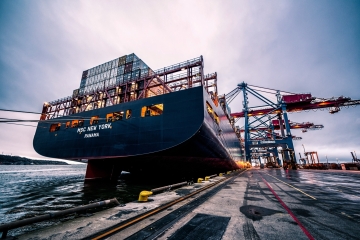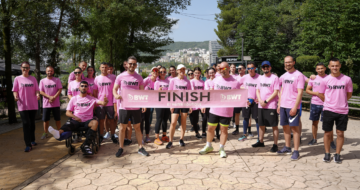VIL tests concept 'Physical Internet' in ports of Antwerp and Zeebrugge

Innovation platform for logistics VIL is working with imec and VUB Mobi on a pilot project to test the Physical Internet (PI) concept for transport in the ports of Antwerp and Zeebrugge.
Innovation platform for logistics VIL is working with imec and VUB Mobi on a pilot project to test the Physical Internet (PI) concept for transport in the ports of Antwerp and Zeebrugge.
According to this principle, logistic processes and networks are bundled, allowing goods to be transported in an optimal way.
The Physical Internet is an idea to organize transport according to the principles of the digital Internet: instead of a fragmented landscape in which each transport company goes its separate way, a bundled network is created to transport all goods as quickly and efficiently as possible. "In the same way that an email uses the full network capacity to go from sender to receiver, goods should use the full capacity of the infrastructure," says Tomas Ambra, Research Director for Logistics at imec EDiT.
The end result is an integrated solution where all modes of transport can be deployed in combination. "The PI opens the door to numerous new logistics business models in which an umbrella IT system shows logistics service providers opportunities in terms of collaboration, and the more efficient use of available personnel, assets and transport capacity. As a result, it will make a significant contribution to reducing logistics costs, making the logistics sector more sustainable and increasing service levels", says Liesbeth Geysels, General Director of VIL.
Within the PILL (Physical Internet Living Lab) project, VIL, imec and VUB Mobi are now going to work with more than twenty partners from the logistics sector on PI in the ports. In Antwerp and Zeebrugge an IT prototype will be tested to unify the processes of the many companies in and around the ports.
Initially, PILL will be limited to the port ecosystems. From 2023 onwards, the initiators want to roll out the concept further in Flanders, Europe and eventually the whole world.
Latest insights & stories

ROAD SAFETY
Since 2018, the number of traffic casualties in Flanders has risen again. Currently, the figures are stagnating, but the risk of accidents with injuries remains high for vulnerable road users in Flanders. And that while traffic should be safe for all users and modes. We want to change this by focusing on transparent policy, training on safe behavior, infrastructure improvements, legislation and enforcement.

What is needed for a more circular construction sector? Insights from Sien Cornillie, Circularity expert at NAV
NAV, or "Netwerk Architecten Vlaanderen," is a professional organisation for architects in Flanders. It offers various services including professional development and advocacy for the architectural sector. NAV also fosters networking opportunities and provides advice on legal, technical, and management aspects. The network is currently working on a position paper on circularity. We sat down with Sien Cornillie, an expert on circularity and energy at NAV. This interview reflects her own opinion.

A Global Movement: The World Unites in a Pink Pledge for Clean and Sustainable Water
5,000 participants. 32 countries. €30,000 funds raised. And that's just the beginning.
Picture this: One step that sends ripples across the globe, transforming lives and creating waves of change. You might wonder, how can such a simple action for most of us have such a profound impact?